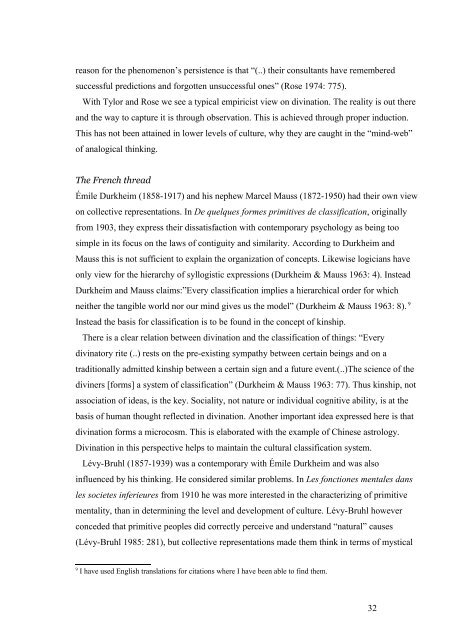The dissemination of divination in roman republican times
The dissemination of divination in roman republican times
The dissemination of divination in roman republican times
Create successful ePaper yourself
Turn your PDF publications into a flip-book with our unique Google optimized e-Paper software.
eason for the phenomenon’s persistence is that “(..) their consultants have remembered<br />
successful predictions and forgotten unsuccessful ones” (Rose 1974: 775).<br />
With Tylor and Rose we see a typical empiricist view on <strong>div<strong>in</strong>ation</strong>. <strong>The</strong> reality is out there<br />
and the way to capture it is through observation. This is achieved through proper <strong>in</strong>duction.<br />
This has not been atta<strong>in</strong>ed <strong>in</strong> lower levels <strong>of</strong> culture, why they are caught <strong>in</strong> the “m<strong>in</strong>d-web”<br />
<strong>of</strong> analogical th<strong>in</strong>k<strong>in</strong>g.<br />
<strong>The</strong> French thread<br />
Émile Durkheim (1858-1917) and his nephew Marcel Mauss (1872-1950) had their own view<br />
on collective representations. In De quelques formes primitives de classification, orig<strong>in</strong>ally<br />
from 1903, they express their dissatisfaction with contemporary psychology as be<strong>in</strong>g too<br />
simple <strong>in</strong> its focus on the laws <strong>of</strong> contiguity and similarity. Accord<strong>in</strong>g to Durkheim and<br />
Mauss this is not sufficient to expla<strong>in</strong> the organization <strong>of</strong> concepts. Likewise logicians have<br />
only view for the hierarchy <strong>of</strong> syllogistic expressions (Durkheim & Mauss 1963: 4). Instead<br />
Durkheim and Mauss claims:”Every classification implies a hierarchical order for which<br />
neither the tangible world nor our m<strong>in</strong>d gives us the model” (Durkheim & Mauss 1963: 8). 9<br />
Instead the basis for classification is to be found <strong>in</strong> the concept <strong>of</strong> k<strong>in</strong>ship.<br />
<strong>The</strong>re is a clear relation between <strong>div<strong>in</strong>ation</strong> and the classification <strong>of</strong> th<strong>in</strong>gs: “Every<br />
div<strong>in</strong>atory rite (..) rests on the pre-exist<strong>in</strong>g sympathy between certa<strong>in</strong> be<strong>in</strong>gs and on a<br />
traditionally admitted k<strong>in</strong>ship between a certa<strong>in</strong> sign and a future event.(..)<strong>The</strong> science <strong>of</strong> the<br />
div<strong>in</strong>ers [forms] a system <strong>of</strong> classification” (Durkheim & Mauss 1963: 77). Thus k<strong>in</strong>ship, not<br />
association <strong>of</strong> ideas, is the key. Sociality, not nature or <strong>in</strong>dividual cognitive ability, is at the<br />
basis <strong>of</strong> human thought reflected <strong>in</strong> <strong>div<strong>in</strong>ation</strong>. Another important idea expressed here is that<br />
<strong>div<strong>in</strong>ation</strong> forms a microcosm. This is elaborated with the example <strong>of</strong> Ch<strong>in</strong>ese astrology.<br />
Div<strong>in</strong>ation <strong>in</strong> this perspective helps to ma<strong>in</strong>ta<strong>in</strong> the cultural classification system.<br />
Lévy-Bruhl (1857-1939) was a contemporary with Émile Durkheim and was also<br />
<strong>in</strong>fluenced by his th<strong>in</strong>k<strong>in</strong>g. He considered similar problems. In Les fonctiones mentales dans<br />
les societes <strong>in</strong>ferieures from 1910 he was more <strong>in</strong>terested <strong>in</strong> the characteriz<strong>in</strong>g <strong>of</strong> primitive<br />
mentality, than <strong>in</strong> determ<strong>in</strong><strong>in</strong>g the level and development <strong>of</strong> culture. Lévy-Bruhl however<br />
conceded that primitive peoples did correctly perceive and understand “natural” causes<br />
(Lévy-Bruhl 1985: 281), but collective representations made them th<strong>in</strong>k <strong>in</strong> terms <strong>of</strong> mystical<br />
9 I have used English translations for citations where I have been able to f<strong>in</strong>d them.<br />
32


